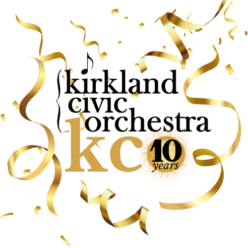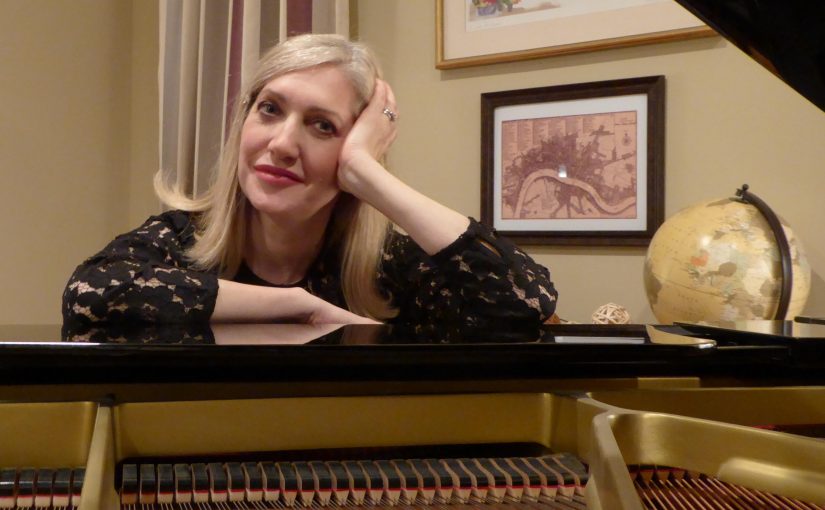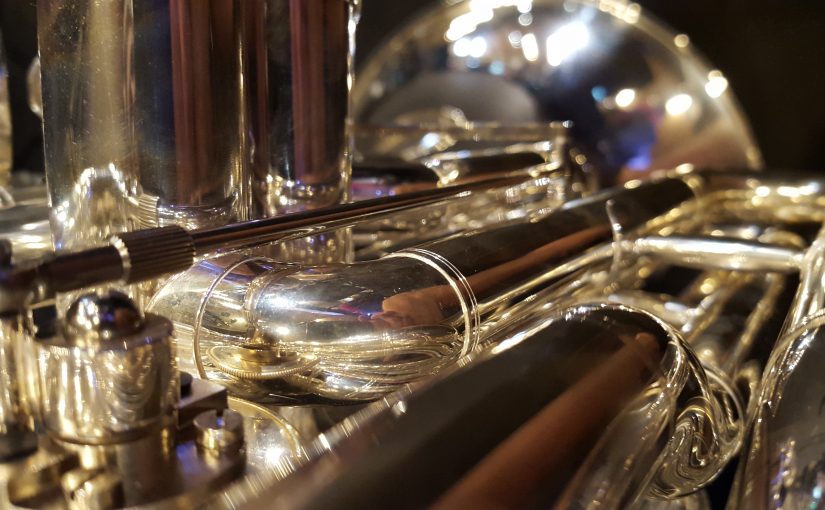Susan Harris will be the piano soloist for the at our next performance, playing Turina – Rapsodia sinfónica, for piano & orchestra, Op. 66. We asked Susan some questions in a fun and spirited exchange.
- When did you start playing music and was it always the piano?
- When did you know that you wanted to be a professional or a teacher?
- Which role you like best: Soloist, accompanist, and playing with an orchestra or rhythm section?
- What’s your connection to the Kirkland Civic Orchestra?
- What are your impressions of the Turina, your solo piece? Any insights for other musicians?
KCO: When did you start playing music and was it always the piano?
Susan: Yes, it was always the piano, well, no. Let me stop. I started playing when I was seven.
Both my parents worked and so I was collected from school every day by a friend’s mother. She sent both her daughters to piano lessons. And of course, I went with them. I just sat there and waited and every time we came home, I went and practiced everything they had just been taught. Because I would look and watch. To the point where the friend’s mother said to my mother, it’s a waste of money sending my girls to piano lessons, when your Susan is the one who’s actually taking notes and practicing!
That’s when my parents started sending me to lessons. And I loved it! Otherwise, I probably wouldn’t have started piano lessons.
KCO: I ask was ‘it always the piano’ because most of my accompanists were people who played piano and other instruments. That’s why I was curious about that.
Susan: I did try other instruments. I think we all had recorder lessons at school, didn’t we? I tried the clarinet for a while because I was trying to get to an orchestral instrument. Being a pianist is a very lonely job. So I tried the clarinet. I wasn’t very good, and I wasn’t very enamored. My lip went numb, and I just didn’t want to stick with it. Piano is easier.
Then I started violin lessons. The teacher asked me at the end of the term, “are you going to continue?” And I said, “yes, please.” And she said, “I wouldn’t bother if I were you. ” Okay! I really enjoyed playing the violin, but I was obviously dreadful. I did one term. I didn’t even do a year. I was that bad.
KCO: That’s crazy about the teacher. You think of them as encouraging.
Susan: Exactly! You know what? That is why I always remember that, and that’s why I’m passionate about teaching. You’ve got to encourage. You’ve got to encourage a love of music.
Everybody has their favorite and least favorite composers. But, you don’t push that onto your students. I don’t tell them which composers I don’t enjoy playing because I don’t want to color their view. I want them to have the experience of playing all different types of music. I’m just so passionate about sharing that excitement in music.
KCO: When did you know that you wanted to be a professional or a teacher?
Susan: Well, it never really crossed my mind that way. Music has always been a part of my life. My mother, when I was first born, she just played Beethoven’s symphonies over and over. I could “la-la” all the themes, but I couldn’t tell you which symphony was which, because I just knew them inside out on the old record player.
Then my dad would come in, in the evenings, and put on Bing Crosby.
KCO: What a contrast.
Susan: Yes! Beethoven and Bing. That’s what I was brought up with. Then Frank Sinatra and all that stuff that my Dad played to me, which I just loved.
I just loved Frank Sinatra and Ella Fitzgerald. There was my mother with Beethoven and Sibelius. She used to conduct the orchestra in the lounge. She used to close her eyes and pretend she was the conductor. So, that’s what I grew up with. Music was always there.
As you go through school, you’re accompanying and you’re doing the competitions at school and the music festivals, and going around the country. You get to an age, well I did, I got to an age of about 14-16 – I got all my grades, all my exams – and I didn’t get any better. My mother thought I was going to be this amazing concert pianist. And she was very disappointed. So thought I’ll go do a music degree then!
KCO: Well, that’s still good. I bet you did get better, but it’s hard to see that sort of thing.
Susan: Yes. I was very good at a young age, and then I just petered out. And life came up. It wasn’t just all about practicing. One, I just wasn’t that good to be a professional concert pianist and also, life comes along. You know, your friends, going out, boys, oh, dear.
KCO: Right. There’s more to being a musician than just a concert pianist.
Susan: Absolutely. I did my music degree. I did my performance diploma. I had to wait until I was 18 to do a teaching diploma, because that’s the youngest you’re allowed to do it in Britain. You can’t be a teacher until you’re 18.
I was doing my degree and then after my degree, I did my post-grad in music education because I just found this is the way to go. I really want to share this. My friends in college were going on to play in orchestras. I played with them, performed and everything, but, piano playing is a lonely job.
KCO: Well, I’ve seen you in the back of the orchestra. You seem to like to be the piano player with the orchestra.
Susan: I do. I do like that because I can be part of something. Once in a while, an orchestra would need a pianist, and just the one, otherwise, you’re performing alone.
KCO: Which role do you like best: Soloist, accompanist, and playing with an orchestra or rhythm section?
Susan: All! I think I like being an accompanist the best. When you’re an accompanist, well, the word says accompanist, as in accompanying. But really, it’s a duet. That’s what I love.
I was just at Central Washington University performing with one of the soloist state finalists. And that was fun, because I could really discuss the music, helping them with the rhythm, helping them with their ideas, spotting what they were doing, interpreting the music.
I remember saying, did you know you did a crescendo here? It’s not in the music, but it fits really well. Let’s do that. Let’s make something of that. And it’s that sort of collaboration that I love. You can do that as an accompanist, or even a member of a chamber music trio. There’s three of us that can discuss it. I love that you can say, well hang on, I’m equal parts here. This is what I think should happen.
KCO: What’s your connection to the Kirkland orchestra?
Susan: I got married to Steve about 5 years ago. He’s American Canadian. We needed to go back to the Seattle area. I’ve got to leave England, have I? And he introduced me to a couple of friends. He knows the Truhers: Jim and Kathy.
I started to attend the Kirkland Orchestra concerts. I was so impressed. Even when my parents came over to visit, I made sure to bring them over. I said, “come and listen to this orchestra. They’re amazing.” Jim found out I played the piano and listened to me. Thankfully, he thought I was good enough to offer: would you like to help us out? I leapt at the chance.
KCO: What are your impressions of the Turina, your solo piece? Any insights for other musicians?
Susan: Well the first time I heard it, I just loved the harmonies. That is my sort of music. I gasped. It reminds me of the Albéniz and the Granados that I used to play when I was younger. Oh, those harmonies, they’re luscious. It is those jazzy chords, and it’s those Spanish rhythms.
Turina is just one of those classic Spanish works where you might go “oh we’re going on holiday to Spain aren’t we?” You can hear it. That’s the beauty of it. I love those types of rhythms and those changes in tempo all over the place. It is so typical of Spanish music. I love that. I just fell in love with the sound of the music first, before I’d even seen the score. And I thought, yes, I want to learn to play that. Yes, Maestro, please.
KCO: Did you choose it or did Jim?
Susan: It was a collaboration actually. He started playing a few pieces to me and as soon as I heard the Turina…I just loved it.
It’s very dramatic, isn’t it? It’s a rhapsody. It’s got loads of dramatic bits, highs and lows. We’re going to change bits here, there everywhere. All encapsulated in about ten minutes.
It sounds as if Turina thought, “oh, I’ve just thought of this old melody I heard when I was young. I think I’ll just throw that in now.” It does connect though. It’s been quite challenging to learn it, but so rewarding. When it comes together, I’m counting and counting because it’s that 6/8 versus the 3/4. Between the bars, and between the parts at the same time. I am furiously counting one and ah two and ah, against the orchestras one and two and three and, at times, and vice versa.
And I’m trying to think this is the part where I’ve got to go, and you get dragged along with the melody that the orchestra has got. Then there’s my part underneath, these luscious chords. I really hope that the audience and other musicians can feel that and hear it.
Interview on May 10, 2017
by Francis X. Langlois – tuba player in the KCO


